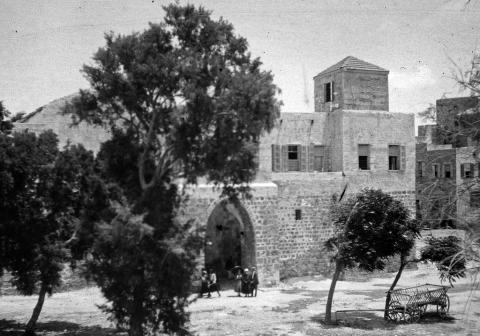Early in the days of ‘Abdu’l-Bahá’s imprisonment in the barracks in ‘Akka, news of His wisdom spread from a butcher’s shop. He and a few of Bahá’u’lláh’s companions had left the barracks to procure food and other necessary items from the markets. In the butcher’s shop where the Master waited to be served, a Muslim and a Christian were apparently expounding the merits of their respective faiths. The Christian was winning the discussion. Thereupon, ‘Abdu’l-Bahá entered the conversation and with simplicity and eloquence proved the validity of Islam to the satisfaction of the Christian. The news of this incident ‘spread and warmed the hearts of many people of ‘Akka towards the Master; this was the beginning of His immense popularity among the inhabitants of that city.’ There even came a time when the governor of the city, Ahmad Big Tawfiq, sent his own son to ‘Abdu’l-Bahá for instruction and enlightenment.
Christianity
After the war, pilgrimages were resumed. Among the last of those fortunate pilgrims to visit ‘Abdu’l-Bahá were the members of the Edwin Mattoon family. In their great longing to reach His side, they had asked if they might come from the United States ‘if only for a day’. Permission was granted. With their two little daughters, Florence (Zmeskal) and Annamarie (Baker), the latter only three months old, they joyously set sail. They were asked to take a part of an automobile so that the Master’s sent by American friends might be repaired. Somehow they managed that, too. Annie Mattoon remembered later that ‘Abdu’l-Bahá said to them, ‘You must never forget Christ.’ With this encouragement, they included visits to the Holy Places of Christianity. “Today, also, Bahá’ís frequently make the ‘wider pilgrimage’.)
At one time the Master was asked, ‘What shall I say to those who state that they are satisfied with Christianity and do not need this present Manifestation?’ His reply was clear: ‘Let them alone. What would they do if a former king had reigned and a new king was not seated upon the throne? They must acknowledge the new king, or they are not true subjects of the Kingdom. Last year there was a springtime. Can a man say “I do not need a new springtime this year the old springtime is enough for me”? No! The new spring must come to fill the earth with beauty and brightness.’
